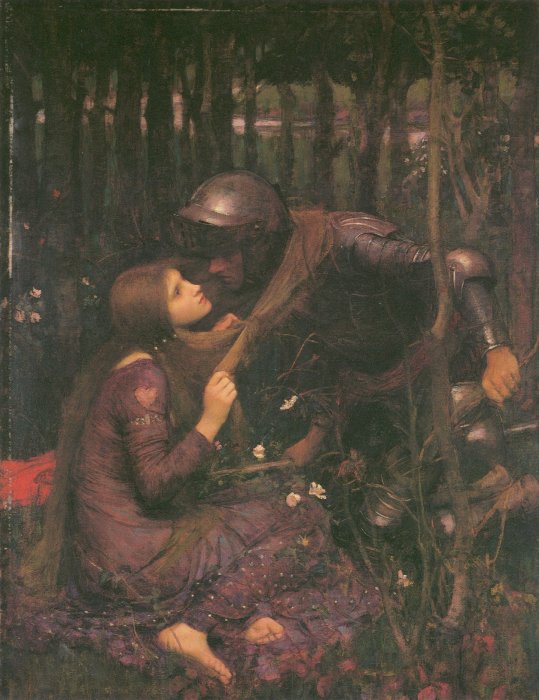基本介紹
- 作品名稱:《無情的妖女》
- 創作年代:1819年4月
- 文學體裁:詩歌
- 作者:濟慈
簡介,原稿,刊印版,詩文漢譯,作者簡介,
簡介
《無情的妖女》 這首詩的詩名是法文的,原是法國普羅旺斯一支歌曲的名字。詩用民謠形式寫成,詩段簡潔,用詞古樸,節奏簡單而富於誘惑力,卻不止是講述民謠中常見的一類故事,而是寫得更淒冷、更有魅力,瀰漫著一種中世紀情調。有學者推測是受斯賓塞等前人影響;有說可能與濟慈和范妮·布勞恩之間的愛情問題以及弟弟湯姆患結核病去世的影響有關;還有的認為可以看作詩人對於詩歌本身的又熱愛又戒懼的心情表現,表現浪漫主義精神的一個方面。詩歌現存兩個版本,一版是原稿,附於1819年4月21日給弟弟喬治的信中,另一個是第一次刊印時的版本。普遍認為初稿好於發行版,是出於誰的意願做出改動,我們不得而知了。
原稿
Original version of La Belle Dame Sans Merci,1819
Oh what can ail thee, knight-at-arms, Alone and palely loitering? The sedge has withered from the lake, And no birds sing. Oh what can ail thee, knight-at-arms, So haggard and so woe-begone? The squirrel';s granary is full, And the harvest';s done. I see a lily on thy brow, With anguish moist and fever-dew, And on thy cheeks a fading rose Fast withereth too. I met a lady in the meads, Full beautiful - a faery';s child, Her hair was long, her foot was light, And her eyes were wild. I made a garland for her head, And bracelets too, and fragrant zone; She looked at me as she did love, And made sweet moan. I set her on my pacing steed, And nothing else saw all day long, For sidelong would she bend, and sing A faery';s song. She found me roots of relish sweet, And honey wild, and manna-dew, And sure in language strange she said - ';I love thee true';. She took me to her elfin grot, And there she wept and sighed full sore, And there I shut her wild wild eyes With kisses four. And there she lulled me asleep And there I dreamed - Ah! woe betide! - The latest dream I ever dreamt On the cold hill side. I saw pale kings and princes too, Pale warriors, death-pale were they all; They cried - ';La Belle Dame sans Merci Hath thee in thrall!'; I saw their starved lips in the gloam, With horrid warning gaped wide, And I awoke and found me here, On the cold hill';s side. And this is why I sojourn here Alone and palely loitering, Though the sedge is withered from the lake, And no birds sing.
刊印版
Published version of La Belle Dame Sans Merci, 1820
Ah, what can ail thee, wretched wight, Alone and palely loitering; The sedge is wither';d from the lake, And no birds sing. Ah, what can ail thee, wretched wight, So haggard and so woe-begone? The squirrel';s granary is full, And the harvest';s done. I see a lily on thy brow, With anguish moist and fever dew; And on thy cheek a fading rose Fast withereth too. I met a lady in the meads Full beautiful, a faery';s child; Her hair was long, her foot was light, And her eyes were wild. I set her on my pacing steed, And nothing else saw all day long; For sideways would she lean, and sing A faery';s song. I made a garland for her head, And bracelets too, and fragrant zone; She look';d at me as she did love, And made sweet moan. She found me roots of relish sweet, And honey wild, and manna dew; And sure in language strange she said, I love thee true. She took me to her elfin grot, And there she gaz';d and sighed deep, And there I shut her wild sad eyes-- So kiss';d to sleep. And there we slumber';d on the moss, And there I dream';d, ah woe betide, The latest dream I ever dream';d On the cold hill side. I saw pale kings, and princes too, Pale warriors, death-pale were they all; Who cry';d--"La belle Dame sans merci Hath thee in thrall!" I saw their starv';d lips in the gloam With horrid warning gaped wide, And I awoke, and found me here On the cold hill side. And this is why I sojourn here Alone and palely loitering, Though the sedge is wither';d from the lake, And no birds sing.
詩文漢譯
騎士啊,是什麼苦惱你
獨自沮喪地遊蕩?
湖中的蘆葦已經枯了,
也沒有鳥兒歌唱!
騎士啊,是什麼苦惱你,
這般憔悴和悲傷?
松鼠的小巢貯滿食物,
莊稼也都進了穀倉。
你的額角白似百合
垂掛著熱病的露珠,
你的面頰像是玫瑰,
正在很快地凋枯。——
我在草坪上遇見了
一個妖女,美似天仙
她輕捷、長發,而眼裡
野性的光芒閃閃。
我給她編織過花冠、
芬芳的腰帶和手鐲,
她柔聲地輕輕太息,
仿佛是真心愛我。
我帶她騎在駿馬上.
她把臉兒側對著我.
我整日什麼都不顧,
只聽她的妖女之歌。
她給采來美味的草根、
野蜜、甘露和仙果,
她用了一篇奇異的話,
說她是真心愛我。
她帶我到了她的山洞,
又是落淚.又是悲嘆,
我在那兒四次吻著
她野性的、野性的眼。
我被她迷得睡著了,
啊,做了個驚心的噩夢
我看見國王和王子
也在那妖女的洞中。
還有無數的騎士,
都蒼白得像是骷髏;
他們叫道:無情的妖女
已把你作了俘囚!
在幽暗裡,他們的癟嘴
大張著,預告著災禍;
我一覺醒來,看見自己
躺在這冰冷的山坡。
因此,我就留在這兒,
獨自沮喪地遊蕩;
雖然湖中的蘆葦已枯
也沒有鳥兒歌唱。(查良錚譯)
作者簡介
濟慈,全名約翰·濟慈John Keats(1795年—1821年),出生於18世紀末年的倫敦,他是傑出的英國詩作家之一,也是浪漫派的主要成員。其一生寫出了大量的優秀作品,其中包括《聖艾格尼絲之夜》《秋頌》《夜鶯頌》和《致秋天》等名作,表現出詩人對大自然的強烈感受和熱愛,為他贏得巨大聲譽。濟慈詩才橫溢,與雪萊、拜倫齊名。他的生命只有25歲,但其遺下的詩篇一直譽滿人間,被認為完美地體現了西方浪漫主義詩歌的特色,並被推崇為歐洲浪漫主義運動的傑出代表。他主張“美即是真,真即是美”,擅長描繪自然景色和事物外貌,表現景物的色彩感和立體感,重視寫作技巧,語言追求華美,對後世抒情詩的創作影響極大。1893年,前拉斐爾派畫家渥特豪斯受到這首詩的啟發,畫下他最著名的同名畫。

